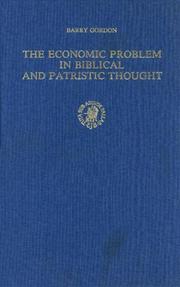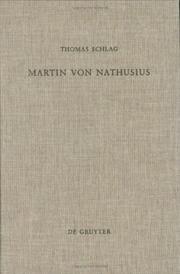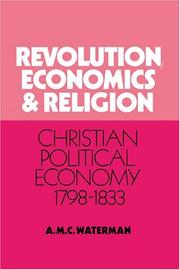| Listing 1 - 6 of 6 |
Sort by
|
Book
ISBN: 9782226324191 2226324194 Year: 2017 Publisher: Paris : Albin Michel,
Abstract | Keywords | Export | Availability | Bookmark
 Loading...
Loading...Choose an application
- Reference Manager
- EndNote
- RefWorks (Direct export to RefWorks)
Le Moyen âge chrétien, ennemi de l'argent, n'a pas connu de pensée économique, car celle-ci ne pouvait émerger que dans le monde sécularisé que permit la Réforme. Et si cette conviction si largement diffusée était fausse ? Et si les processus économiques avaient été au coeur de la pensée médiévale ? Parcourant, à l'écoute des moines, évêques, frères mendiants et universitaires, les voies de la pensée européenne entre Antiquité et époque moderne, Giacomo Todeschini fait émerger un monde intellectuel passionné par les problèmes spirituels, moraux et politiques que posent la circulation de la richesse, sa création, sa distribution, son usage, son contrôle. L'économie chrétienne qu'il fait apparaître, avec ses controverses et ses voies de consensus, engage la vie tout entière de la communauté des fidèles, et participe des dynamiques d'exclusion (des juifs, des hérétiques, des pauvres) qui donneront à la société européenne sa force propre, sa capacité à la solidarité et sa brutalité. Cet ouvrage révèle les liens étroits qui unirent, dans les sociétés médiévales, religion et économie, richesse matérielle et spiritualité. Ce faisant, il s'adresse à tous ceux qui veulent comprendre aujourd'hui pourquoi et comment est née une "science" économique.
Economics --- Economic history --- Religious aspects --- Christianity --- History --- Richesse --- Aspect religieux --- Christianisme --- Economics - Religious aspects - Christianity - History --- Economic history - Medieval, 500-1500
Book
ISBN: 1299463584 0300178093 9780300178098 9780300170269 0300170262 9781299463585 0300205538 9780300205534 Year: 2012 Publisher: New Haven Yale University Press
Abstract | Keywords | Export | Availability | Bookmark
 Loading...
Loading...Choose an application
- Reference Manager
- EndNote
- RefWorks (Direct export to RefWorks)
In this book a MacArthur Award-winning scholar argues for a radically new interpretation of the conversion of Scandinavia from paganism to Christianity in the early Middle Ages. Overturning the received narrative of Europe's military and religious conquest and colonization of the region, Anders Winroth contends that rather than acting as passive recipients, Scandinavians converted to Christianity because it was in individual chieftains' political, economic, and cultural interests to do so.Through a painstaking analysis and historical reconstruction of both archeological and literary sources, and drawing on scholarly work that has been unavailable in English, Winroth opens up new avenues for studying European ascendency and the expansion of Christianity in the medieval period.
Vikings --- Economics --- Conversion --- Northmen --- Economic theory --- Political economy --- Social sciences --- Economic man --- Commerce --- History. --- Religious aspects --- Christianity --- Religion. --- Christianity. --- Scandinavia --- Fennoscandia --- Norden --- Nordic countries --- Economic conditions. --- Religion --- Vikings -- Commerce -- History.. --- Economics -- Religious aspects -- Christianity -- History.. --- Vikings -- Religion.. --- Conversion -- Christianity.. --- Scandinavia -- Commerce -- History.. --- Scandinavia -- Economic conditions.. --- Scandinavia -- Religion -- History.

ISBN: 9004090487 9004312765 9789004090484 Year: 1989 Volume: 9 Publisher: Leiden Brill
Abstract | Keywords | Export | Availability | Bookmark
 Loading...
Loading...Choose an application
- Reference Manager
- EndNote
- RefWorks (Direct export to RefWorks)
Economics --- Economie politique --- Moral and ethical aspects --- History --- Religious aspects --- Christianity --- Aspect moral --- Histoire --- Aspect religieux --- Christianisme --- History. --- 22.08*2 --- -Economics --- -#GROL:SEMI-221.08*3 --- Economic theory --- Political economy --- Social sciences --- Economic man --- Bijbelse theologie: moraal; ethica; socialia; juridica Israelis; spiritualiteit --- -History --- -Christianity --- 22.08*2 Bijbelse theologie: moraal; ethica; socialia; juridica Israelis; spiritualiteit --- #GROL:SEMI-221.08*3 --- Moral and ethical aspects&delete& --- Religious aspects&delete& --- Christianity&delete& --- Economics - Moral and ethical aspects - History. --- Economics - Religious aspects - Christianity - History.
Book
ISBN: 9780300170269 9780300205534 0300170262 Year: 2012 Publisher: New Haven, Conn. Yale University Press
Abstract | Keywords | Export | Availability | Bookmark
 Loading...
Loading...Choose an application
- Reference Manager
- EndNote
- RefWorks (Direct export to RefWorks)
"In this book a MacArthur Award-winning scholar argues for a radically new interpretation of the conversion of Scandinavia from paganism to Christianity in the early Middle Ages. Overturning the received narrative of Europe's military and religious conquest and colonization of the region, Anders Winroth contends that rather than acting as passive recipients, Scandinavians converted to Christianity because it was in individual chieftains' political, economic, and cultural interests to do so. Through a painstaking analysis and historical reconstruction of both archeological and literary sources, and drawing on scholarly work that has been unavailable in English, Winroth opens up new avenues for studying European ascendency and the expansion of Christianity in the medieval period"--
Vikings --- Economics --- Conversion --- Commerce --- History --- Religious aspects --- Christianity --- Religion --- Scandinavia --- Economic conditions --- 936.8 --- 936.8 Geschiedenis van de Scandinaviërs, de Noormannen en de Vikings --- Geschiedenis van de Scandinaviërs, de Noormannen en de Vikings --- Economie politique --- History. --- Religion. --- Christianity. --- Histoire --- Aspect religieux --- Christianisme --- Scandinavie --- Economic conditions. --- Conditions économiques --- Vikings - Commerce - History --- Economics - Religious aspects - Christianity - History --- Vikings - Religion --- Conversion - Christianity --- Scandinavia - Commerce - History --- Scandinavia - Economic conditions --- Scandinavia - Religion - History --- Christian church history --- History of Scandinavia and Iceland --- anno 800-1199 --- anno 700-799

ISBN: 3110158620 3110806231 9783110158625 Year: 2011 Volume: 93 Publisher: Berlin ; Boston : De Gruyter,
Abstract | Keywords | Export | Availability | Bookmark
 Loading...
Loading...Choose an application
- Reference Manager
- EndNote
- RefWorks (Direct export to RefWorks)
Nathusius, Martin von, --- 2 VON NATHUSIUS, MARTIN --- Godsdienst. Theologie--VON NATHUSIUS, MARTIN --- -Nathusius, Martin von --- -Godsdienst. Theologie--VON NATHUSIUS, MARTIN --- 2 VON NATHUSIUS, MARTIN Godsdienst. Theologie--VON NATHUSIUS, MARTIN --- -241.65*2 Theologische ethiek: sociale rechtvaardigheid --- Christian ethics --- Economics --- Social ethics --- 241.65*2 --- 241.65*2 Theologische ethiek: sociale rechtvaardigheid --- Theologische ethiek: sociale rechtvaardigheid --- Ethics --- Social problems --- Sociology --- Economic theory --- Political economy --- Social sciences --- Economic man --- Ethical theology --- Moral theology --- Theology, Ethical --- Theology, Moral --- Christian life --- Christian philosophy --- Religious ethics --- History --- Religious aspects --- Christianity --- Von Nathusius, Martin, --- Social ethics - History - 19th century --- Christian ethics - History - 19th century --- Economics - Religious aspects - Christianity - History - 19th century --- Nathusius, Martin von, - 1843-1906

ISBN: 0521394473 0521030382 0511521502 0511832583 Year: 1991 Publisher: Cambridge Cambridge University press
Abstract | Keywords | Export | Availability | Bookmark
 Loading...
Loading...Choose an application
- Reference Manager
- EndNote
- RefWorks (Direct export to RefWorks)
Malthus's Essay on Population was seen in 1798 as a complete refutation of Godwin and all 'Jacobin' ideology. It proved that a state of equality and justice for all was unfeasible; and it demonstrated the inevitability and beneficence of private property and political institutions. But its central theme, the dominance of scarcity in human affairs, presented the theological 'problem of evil' in novel and threatening form. For thirty-five years both the economics and the theology of the Essay were modified and refined: first by Paley, Sumner and Malthus himself, and later by Copleston, Whately and Chalmers. The result was 'Christian Political Economy': an ideological alliance of political economy and Christian theology, congenial to a new 'liberal-conservatism' in the early nineteenth century, which found middle ground between the ultra-tory defence of the ancien régime and a 'radical' repudiation of existing institutions. Professor Waterman analyses this story of the 'intellectual repulse of revolution', and describes the ideological alliance of political economy and Christian theology after 1798.
Malthus, Thomas Robert --- 32.001 --- Conservatism --- -Theodicy --- -Conservatism --- -Christian sociology --- -Christianity and politics --- -Economics --- -Revolutions --- -#SBIB:321H440 --- Insurrections --- Rebellions --- Revolts --- Revolutionary wars --- History --- Political science --- Political violence --- War --- Government, Resistance to --- Economic theory --- Political economy --- Social sciences --- Economic man --- Christianity --- Church and politics --- Politics and Christianity --- Politics and the church --- Christian social theory --- Social theory, Christian --- Sociology, Christian --- Sociology --- Conservativism --- Neo-conservatism --- New Right --- Right (Political science) --- Evil, Problem of (Theology) --- God --- Permissive will of God --- Problem of evil (Theology) --- Good and evil --- Politieke wetenschap --- -History of doctrines --- -Religious aspects --- -Christianity --- -History --- -Protestant churches --- -Congresses --- Religious aspects --- Westerse politieke en sociale theorieën vanaf de 19e eeuw: christelijke gedachte: opvattingen over economie en arbeid --- Political aspects --- Permissive will --- Will, Permissive --- Malthus, T. R. --- 32.001 Politieke wetenschap --- Christianity and politics --- Christian sociology --- Economics --- Revolutions --- Theodicy --- #SBIB:321H440 --- Protestant churches --- History of doctrines --- Great Britain --- Politics and government --- 1789-1820 --- 1800-1837 --- Sociology, Christian - Great Britain - History of doctrines. --- Christianity and politics - Protestant churches. --- Economics - Religious aspects - Christianity - History of doctrines. --- Malthus, T. R. (Thomas Robert), 1766-1834. An essay on the principle of population. --- Theodicy - History of doctrines. --- Conservatism - Great Britain - History. --- Conservatism - Religious aspects - Christianity - History of doctrines. --- Revolutions - Religious aspects - Christianity - History of doctrines. --- Great Britain - Politics and government - 1789-1820. --- Great Britain - Politics and government - 1800-1837. --- Social Sciences --- Political Science
| Listing 1 - 6 of 6 |
Sort by
|

 Search
Search Feedback
Feedback About UniCat
About UniCat  Help
Help News
News